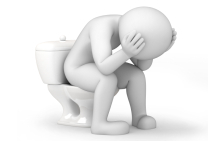NCD Watch
Constipation - Find the Way Out
28 Jul 2014 (Mon)
 Constipation generally refers to having difficulty in passing or infrequent passage of faeces (typically fewer than 3 times per week), often accompanied by passing hard and lumpy faeces, excessive straining, a feeling of incomplete emptying or obstruction. In Hong Kong, constipation is a common bowel complaint, with prevalence of 14.3% among community-dwelling adults, 12.2% among primary school students, and 28.8% among pre-school children, as revealed by local surveys.
Constipation generally refers to having difficulty in passing or infrequent passage of faeces (typically fewer than 3 times per week), often accompanied by passing hard and lumpy faeces, excessive straining, a feeling of incomplete emptying or obstruction. In Hong Kong, constipation is a common bowel complaint, with prevalence of 14.3% among community-dwelling adults, 12.2% among primary school students, and 28.8% among pre-school children, as revealed by local surveys.
Although symptoms of constipation are often intermittent with no lasting health effects, they can be uncomfortable and disturbing to daily life. If constipation is left untreated and lingers for too long, it can lead to complications, including faecal impaction, haemorrhoids, anal fissures and rectal prolapse.
Unhealthy lifestyle plays a major role in causing constipation, including unbalanced diet low in dietary fibre but high in animal fats, not drinking enough fluids, lacking in exercise, delaying bowel movements or ignoring the urge to defecate. Constipation can also be attributed to physiological changes (such as pregnancy) or changes in daily routine (such as travel), use of certain medications as well as diseases to which constipation is secondary.
Preventing constipation should be addressed as if preventing any other health problems — starting with a healthy lifestyle:
- Eat a balanced diet with sufficient amounts of fibre-rich foods, such as dried beans and oats;
- Drink adequate amounts of water every day;
- Do physical activity regularly;
- Develop a regular bowel habit; do not ignore the urge to defecate;
- Manage the underlying diseases associated with constipation properly;
- Use laxatives with caution. Always seek advice from your family doctor or a pharmacist before using.
Remember, constipation can also be a sign of a serious underlying disease. Consult your family doctor if you have persistent constipation, blood or mucus in faeces, unexplained weight loss, or any major change in bowel habits.






































